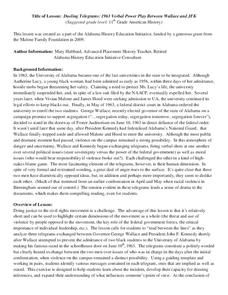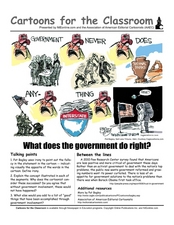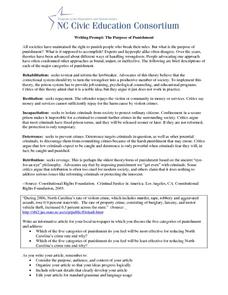Curated OER
What Can You Find in the Cabinet?
Looking in the cabinet can be fascinating! Examine the various departments of the Executive Cabinet in this group research project, which jigsaws so each small group has a different department and presents to the class. Groups create...
Curated OER
News or Propaganda?
What is considered news vs. propaganda? Learners will discuss objectivity and press responsibility while exploring these two concepts. They work in small groups to explore the article in-depth, guided by reading comprehension and...
Alabama Department of Archives and History
Dueling Telegrams: 1963 Verbal Power Play Between Wallace and JFK
Information, inferences, and innuendos. Text and subtext. Class members examine telegrams exchanged between President John F. Kennedy and Alabama Governor George Wallace, studying both what is stated and what is implied by the...
James Madison Memorial Fellowship Foundation
A Picture is Worth a Thousand Words
This exercise on the Constitution requires small groups to design a visual metaphor that expresses the concept behind one of seven principles: popular sovereignty, federalism, republicanism, separation of powers, checks and balances,...
City University of New York
Electoral College
A presidential election is a lot like the 2004 World Series, and it's also a lot like choosing an orange in a paper bag. Apply the process of the electoral college to these two analogies with a set of lessons about government...
Curated OER
Cartoons for the Classroom: Drawing Attention to Government Secrecy
How much do we know about our government? This engaging topic for teens is made especially interesting through analysis of 2 political cartoons. Background information on Sunshine Week makes the cartoons more accessible, and 3 talking...
Curated OER
What Does the Government Do Right?
Challenge your class to reevaluate preconceived notions about government with this political cartoon analysis. An image presents a clear example of irony, in which a disgruntled American complains about his government, yet fails to see...
Judicial Learning Center
State Courts vs. Federal Courts
Popular culture often portrays the Feds as the most fearsome of law enforcement agencies. Yet, someone charged with a crime is considerably more likely to end up in a state court. The lesson, one of six covering the Organization of the...
Curated OER
Why Do Governments Exist? Locke, Hobbes, Montesquieu, and Rousseau
Here is a great secondary source reading that includes the primary ideas and philosophies of the famed Enlightenment philosophers: Thomas Hobbes, John Locke, Charles Montesquieu, and Jean-Jacques Rousseau. In additional to discussing...
Delegation of the European Union to the United States
Structure of Government within the EU
The political system of the European Union is historically unique and has been constantly evolving. To better understand the structure of the EU, class members compare the EU's branches to those of the United States Federal Government.
Curated OER
Social Studies: The Book of Exodus
Intended for a Christian audience, bible study, or home-school setting, this lesson has learners analyzing the significance of the ten commandments in today's world. They consider the commandments themselves, discuss their historical and...
Curated OER
Chapter 20: Demand and Supply (Elasticities and Government-Set Prices)
Discussing first the elasticity of demand and then the element of supply, these slides present graphs and bullet points that would easily supplement your economics lecture. Viewers will appreciate the pacing of the slides, making it easy...
iCivics
Wanted: A Just Right Government
What type of government did American colonists gain and seek after gaining their independence after the Revolutionary War? Here is activity that will guide your young learners through the new nation's progression from the Articles of...
Curated OER
Taxes in U.S. History: The Social Security Act of 1935
Students explain the history of the Social Security Act and the FICA tax. They describe what Social Security is and whom it is intended to help. They explain the purpose of the FICA tax.
Curated OER
What Can We Learn about India from a Ten Rupee Bank Note?
The class finds and cites evidence showing India's unity in diversity and work to recognize some of the complex interactions of a civilized community. They read to understand how geography, history, politics, economics,...
Administrative Office of the US Courts
Hazelwood v. Kuhlmeier
Freedom of speech is not always free. Scholars investigate how the First Amendment provides for the right to express opinions. Through the court case Hazelwood v. Kuhlmeier, they analyze free speech using primary documents—and hopefully...
Curated OER
Qaddafi Is Dead in Libya
The New York Times posted an article titled, "Qaddafi Is Dead in Libya" back in 2011. Your class gets a chance to read that article to better understand current events and increase their reading comprehension. After reading the article,...
North Carolina Consortium for Middle East Studies
Federalists v. Anti‐Federalists
Here is a solid lesson plan to support your instruction on the Continental Congress and the Articles of Confederation. It includes close analysis of primary source images, a guided notes template and answer key, and many key...
University of the Desert
Why Is Cultural Diversity a Positive Thing?
From more empathetic individuals to greater tolerance in government, learners explore the benefits of a culturally diverse world through a series of collaborative, discussion-based activities.
Curated OER
Cartoons for the Classroom: Oh, What's the Next Crisis?
As scholars examine a simple political cartoon, they consider some of the crises of 2009: oil, foreign wars, energy, global warming, Swine Flu, etc. A list is provided for background information, and 3 talking points (or writing points)...
Carolina K-12
Writing Prompt: The Purpose of Punishment
When punishment is given in a society when a member breaks its rules, what is it meant to accomplish? After summarizing the significant categories of punishment (rehabilitation, restitution, incapacitation, deterrence, and retribution),...
Youth Outreach
Connecting the Separate Powers
Scholars demonstrate what they know about the separation of powers through role play. Two individuals act out a skit as the remaining class members discuss and decide whether the interaction they observed is an appropriate example...
Judicial Learning Center
The Constitution and Rights
What's the right way to teach young historians about the Bill of Rights? Many an instructor has asked this question when pondering lesson plans over the US Constitution. The Constitution and Rights is a nifty resource that provides a...
C-SPAN
Presidential Veto and Congressional Override
One of the key powers of the executive branch is the president's ability to pass or veto legislation proposed by Congress. Congress, the legislative branch, on the other hand, can override a president's veto. Five film clips show how the...

























